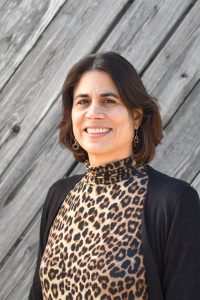Dr. Desiree W. Murray, PhD, has received a grant from the US Department of Education1 to test the effectiveness of a mindfulness-based social-emotional learning (SEL) program, called Be CALM (Cool, Attentive, Logical, and Mature). The Be CALM program will be implemented in a multi-tiered format, with teachers providing a student curriculum and school counselors working with those students who need additional support. The program will be delivered in Early College high schools in predominantly rural areas across North Carolina that provide dual enrollment in college classes to students who have been traditionally underrepresented in post-secondary education.

Due to the pandemic, high school students experienced unparalleled stress and lost opportunities for developing social-emotional skills, contributing to a public health crisis in adolescent mental health where 44% of high school students reported feelings of sadness or hopelessness in the past year, and 20% seriously considered suicide. Stress related concerns occur at even higher rates among students identifying as female and LBGTQ+. Many schools are struggling to meet these increased student mental health needs. Murray noted that rural high schools often experience the greatest needs but the fewest resources.
Students enrolled in accelerated learning programs like Early College High Schools (ECHSs) face additional stressors that compromise their emotional wellbeing and may interfere with their academic success. Because they serve students historically underrepresented in higher education including students of color and those from first-generation and low-income backgrounds, social-emotional supports that address the needs of students from historically marginalized backgrounds are particularly needed in this context.
Although social-emotional learning (SEL) programs are a well-established school-based intervention, 88% of high schools report that they are struggling to meet the mental health needs of their students, particularly those for whom preventive strategies alone are inadequate. This may be related to limitations of many SEL programs that ignore the importance of training and supporting educators and that fail to provide a framework for integrating prevention and intervention strategies. To address these gaps, Murray’s team has developed an SEL program based in mindfulness that supports teachers to support student SEL and that engages school counselors as SEL implementation leaders to promote multi-tier whole-school SEL supports.
Murray says that “mindfulness can promote students’ self-awareness so they can act in ways that align with their goals and needs, manage strong emotions, and respond to stressors like taking their first college course more intentionally”. A critical ingredient for the Be CALM program is that it builds teachers’ skills in managing their own stress, creating supportive and inclusive learning environments, building culturally responsive relationships with students, and teaching SEL with compassion and curiosity to help students utilize skills in their daily lives. School counselors are also supported in promoting school-wide mindfulness and utilizing the Be CALM strategies and materials in individual and small group counseling.
During this 5-year project, multi-tiered Be CALM will first be piloted in four schools, and then will be tested in a randomized wait-list controlled trial with 20 Early College High Schools. Murray’s team at HPDP will lead program implementation, with staff who have lived experience in rural schools and cultural backgrounds similar to the students to be served. They are joined by Dr. Dana Griffin in the School of Education, who will provide leadership for professional development with counselors and in promoting equity for underserved students and schools, and Dr. Julie Edmunds, Director of the Early College Research Center at UNC Greensboro. Program evaluation will be conducted by the Education Policy Initiative at Carolina (EPIC), led by Dr. Julie Marks.
Through this collaboration between researchers, educators, and rural schools, the Be CALM team aims to support the social-emotional needs and improve college readiness of over 4,500 high school students. If results are promising, Dr. Murray hopes that the program can be disseminated and scaled for other students in academically accelerated programs within traditional high schools.
Dr. Desiree Murray, PhD, is a clinical psychologist and senior research scientist at the UNC Center for Health Promotion and Disease Prevention whose research focuses on promoting positive youth development, particularly for those living in adversity, by creating more supportive home, school, and community environments.
1The contents of this press release were developed under a grant from the U.S. Department of Education, Education Innovation and Research (EIR) Program. The total project costs include 90% funding from the federal government ($4.0 million) and 10% matching funds from non-governmental school partners (total project costs of $4.4 million). The contents of this press release do not necessarily represent the policy of the U.S. Department of Education, and you should not assume endorsement by the federal government.
